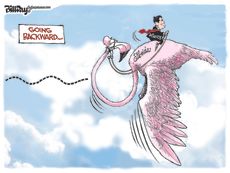Coronavirus is a fast-forward version of what will happen with climate change
But it's also a model of how it might be tackled


The United States will shortly become the epicenter of the novel coronavirus pandemic, if it isn't already. At time of writing some 60,653 American cases have been confirmed, and 784 people have died. It's going to get much, much worse before it gets better — especially if President Trump goes ahead with his evident plan to open the country back up before the virus is controlled.
It's very hard to get one's mind around the scale of the developing calamity. But it also provides an important window into a potential future of unchecked climate change. The coronavirus pandemic is a warp-speed tutorial in what will happen if we don't get our act together and slash greenhouse gas emissions.
The skyrocketing U.S. number of coronavirus cases and deaths is the direct consequence of President Trump's previous inattention and delay months ago. By late December it was clear there was a major risk the virus was going to get out of China, yet Trump didn't set up pre-emptive containment measures. He didn't set up testing or quarantine facilities, and didn't even shut down commercial travel from China until January 31, which was almost certainly already too late — and in any case his administration bungled the transportation of 14 infected Americans so badly that they may have seeded several outbreaks on their own.
Subscribe to The Week
Escape your echo chamber. Get the facts behind the news, plus analysis from multiple perspectives.

Sign up for The Week's Free Newsletters
From our morning news briefing to a weekly Good News Newsletter, get the best of The Week delivered directly to your inbox.
From our morning news briefing to a weekly Good News Newsletter, get the best of The Week delivered directly to your inbox.
As a result, the virus has been spreading in the wild in the U.S. since late January or early February, and the entire time Trump has dragged his feet on setting up an all-out response. He was slow to activate the Army Corps of Engineers, slow to get behind economic rescue plans, and slow to take steps to ramp up the production of tests. To this day he refuses to actually invoke the Defense Production Act to secure needed supplies of ventilators and other medical equipment, leading to chaos as states and foreign countries desperately bid against each other for what remains. Now hospitals are starting to be overwhelmed across the country, and the corpses are piling up.
This is what an uncontrolled, exponentially-accelerating crisis looks like on the ground: first slow, then all at once. Past procrastination and dithering means that once the seriousness of what is happening is undeniable, the worst effects can only be mitigated, not avoided.
Climate change is going to be exactly like this, only on a much longer time scale. Decades have passed with greenhouse gas emissions rising steadily, yet so far the carnage has been relatively modest. The sea level keeps inching up, biological systems are increasingly stressed, ordinary weather patterns keep getting more and more odd, and extreme weather disasters keep getting worse and worse, but so far most human societies have not been seriously threatened.
Absent gargantuan efforts across the world to wrench down emissions, in a couple decades that is going to change very fast. Normal weather patterns will simply not happen anymore. Some areas will suffer devastating drought, and others heavy precipitation — and some places, like California, will swing wildly between the two. Sea level rise will begin to swallow cities where hundreds of millions of people live. Extreme weather disasters — floods, tornado outbreaks, hurricanes, dust storms, and so on — will obliterate crops and crush cities around the world. Many biological systems will break completely, and food sources for billions of people will vanish. Hundreds of millions of refugees will stream around the world.
Indeed, there might well be additional outbreaks of pandemic diseases. Ancient pathogens are still alive in the Siberian permafrost, including anthrax, and possibly smallpox. As the permafrost melts, these could break out and infect a human population with no resistance.
All that is exceptionally grim. However, there may be a glimmer of hope in the response to this coronavirus epidemic. Outside of the United States and Brazil, virtually every country has thrown aside traditional political worries and attacked the pandemic with unprecedented speed and aggression. Concerns about national deficits, printing money, or increasing welfare benefits have evaporated in the face of a society-wide threat. Countries are outright nationalizing whole industries at the drop of a hat. Even in the U.S., after a primary season dominated by moronic "how are you going to pay for that?" concerns, Congress is casually debating a $2 trillion economic rescue package.
What we see is that when sufficiently motivated, countries really can transform themselves practically overnight. Whole continents have gone into emergency lockdown with as few people working as possible. Emissions are tanking with little transportation or production happening. The air around cities like Los Angeles is amazingly clear with so few pollution-spewing cars on the road.
A bold, world-wide climate policy would not be like the coronavirus response in the details or objectives, but the scale is about right. We need to radically transform our systems of manufacturing, energy, agriculture, and transportation, and it needs to happen as soon as possible. If we can completely overhaul whole countries in a matter of days to fight off a pandemic, we could do the same thing to forestall disastrous climate change. It's just a question of political will.
Create an account with the same email registered to your subscription to unlock access.
Sign up for Today's Best Articles in your inbox
A free daily email with the biggest news stories of the day – and the best features from TheWeek.com
Ryan Cooper is a national correspondent at TheWeek.com. His work has appeared in the Washington Monthly, The New Republic, and the Washington Post.
-
 Today's political cartoons - April 15, 2024
Today's political cartoons - April 15, 2024Cartoons Monday's cartoons - flamingos in flight, taxes, and more
By The Week US Published
-
 Empty-nest boomers aren't selling their big homes
Empty-nest boomers aren't selling their big homesSpeed Read Most Americans 60 and older do not intend to move, according to a recent survey
By Peter Weber, The Week US Published
-
 Trump's first criminal trial starts with jury picks
Trump's first criminal trial starts with jury picksSpeed Read The former president faces charges related to hush money payments made to adult film star Stormy Daniels
By Peter Weber, The Week US Published